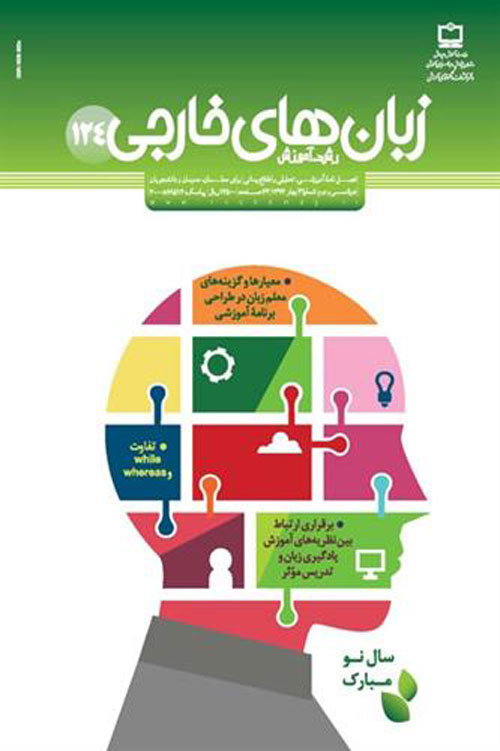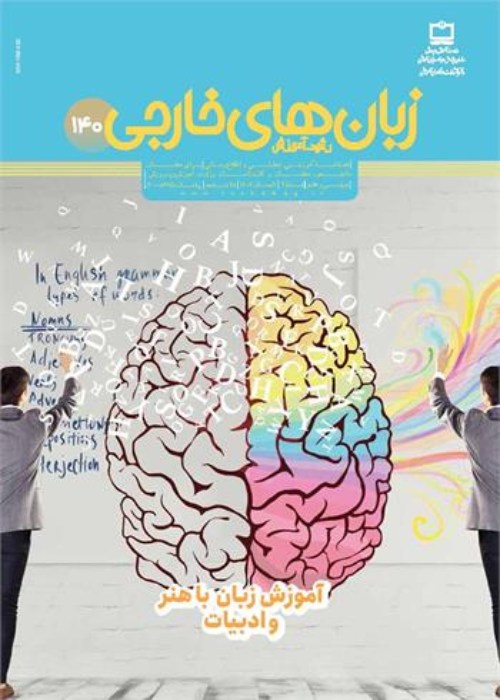فهرست مطالب

نشریه رشد آموزش زبان های خارجی
پیاپی 124 (بهار 1397)
- تاریخ انتشار: 1397/03/22
- تعداد عناوین: 13
- یادداشت سردبیر
- رشد و تربیت معلم
-
صفحه 4
در مقاله پیشین به بررسی شرایط متفاوت زبان آموزان که معلم زبان با آن مواجه می شود پرداختیم. حال با در نظر گرفتن این شرایط معلم زبان باید برنامه آموزشی خود را برای یک بازه زمانی مشخص (یک ترم، یک سال و...) طراحی و بدین منظور موارد متعددی را رعایت کند. این موارد عبات اند از: 1. تبیین اهداف آموزشی و انتخاب محتوای درسی 2. طراحی فعالیت های فردی و گروهی زبان آموزان در کلاس 3. ارزشیابی زبان آموزان 4. بررسی پیشرفت فردی و گروهی زبان آموزان 5. نحوه برخورد با خطاها و اشتباهات زبان آموزان 6. نحوه آموزش مسایل فرهنگی. برای هر یک از موارد ذکر شده دیدگاه های گوناگونی وجود دارد. بی تردید برای طراحی برنامه آموزشی سوال های متعددی به ذهن معلم زبان خطور می کند و او ناچار در جست و جوی پاسخ به سوالات خود بر می آید. مسلما آگاهی لازم نسبت به هر یک از موارد فوق و شناخت شرایط و نیازهای زبان آموزان می تواند در این مسیر او را یار و مددکار باشد. در این مقاله می کوشیم با بیان دیدگاه های متفاوت در خصوص هریک از موارد مزبور معلم زبان را با این دیدگاه ها و مفاهیم آشنا کنیم، باشد که این آشنایی برای طالبان اطلاعات بیشتر در این مباحث مفید واقع شود.
کلیدواژگان: اهداف آموزشی، فعالیت های فردی و گروهی، ارزشیابی، پیشرفت فردی و گروهی، خطاهای زبانی - چکیده پژوهش ها
-
صفحه 7
کتاب درسی انگلیسی پایه هفتم، دوره اول متوسطه در ایران پس از 27 سال براساس برنامه درسی جدید مجددا تالیف شد. این امر باعث شد محققان راغب شوند نقاط قوت و ضعف آن را بررسی کنند. در این راستا، مطالعه ای با هدف ارزشیابی کتاب درسی جدید با پیاده کردن مدل ارزشیابی محیط، ورودی، فرایند و محصول انجام شد.
کلیدواژگان: ارزشیابی کتاب، مدل CIPP، ارزشیابی برنامه درسی، پروژه تدیون کتاب درسی، معلمان پایه هفتم دوره اول متوسطه، روش تحلیل سلسله مراتبی - نقد و نظر
-
تفاوت while و whereas / پیچیدگی آموزش این نکته دستوری به دانش آموزان سال سوم متوسطهصفحه 9
دستور زبان در هر زبانی، بخش مهمی از آموزش آن زبان، به ویژه در آموزش زبان خارجی، است. یکی از این مقوله های زبانی مقوله «کلمات ربط» است که در کوتاه کردن و پیوند مفاهیم جملات نقش مهمی دارند. از جمله این کلمات while و whereas می باشد. دبیران زبان انگلیسی در کتاب درسی فرق بین این دو را نمی دانند. در کتاب درسی پیش دانشگاهی هم که گرامر درس 5 را به این موضوع اختصاص داده است، تفاوتی دیده نمی شود و در تمرین ها همه دانش آموزان را در انتخاب آن ها آزاد گذاشته است که موجب بروز مشکل شده است. مشکل ایجاد شده این است که تصور می شود تفاوتی بین این دو کلمه نیست. ناتوانی در دست یافتن به این تفاوت و اشتباه در نحوه کاربرد آن توسط دبیران، آموزش، تفهیم و فراگیری آن را با مشکلاتی مواجه کرده و موجب بروز خطا در نحوه تدریس این مبحث شده است. بهطور قطع، در اثر این خطای دبیران و گرامرنویسان، این مبحث به بحث انگیزترین و طویل ترین مباحث گرامری تبدیل شده است. عامل یا عوامل تاثیرگذار در بروز این خطا چیست؟ آیا می توان ایده ای جامع ارایه داد؟
- گفت و گو
-
صفحه 14
حمیدرضا خدایاری از زبان خودش: حمیدرضا خدایاری هستم و از سال 1374 تاکنون دبیر رسمی زبان انگلیسی منطقه 14 آموزش و پرورش تهران بوده ام. مدرک کاردانی دبیری خود را از مرکز تربیت معلم بلال حبشی و مدرک کارشناسی را از واحد جنوب دانشگاه آزاد و کارشناسی ارشد خود در رشته آموزش زبان انگلیسی را در سال 1379 از دانشکده زبان های خارجه دانشگاه تهران دریافت کردم. ضمنا با شرکت در آزمون بین المللی IELTS موفق به کسب نمره 8 در این آزمون شده ام. من همواره، در کنار تدریس در مدارس، در مقطع راهنمایی و دبیرستان، مشغول به تدریس در کلاسهای مختلف زبان عمومی و آمادگی آزمونهای بینالمللی و کارشناسی ارشد و دکتری در دانشگاه های مختلف نیز بوده ام. از سال 1379 تاکنون موفق به تالیف 15 عنوان کتاب در حوزه کتاب های کار مدارس و آمادگی برای آزمون ارشد آموزش زبان و واژگان شده ام. در کنار این کار، با کمک همکاران خود در آموزش و پرورش، به تولید محتوای الکترونیک در قالب یک بسته آموزشی برای کتاب های قدیم و جدید هم اقدام کرده ام. علاوه بر این به ویرایش مقالات دانشجویان دکتری جهت چاپ در نشریات خارجی نیز مشغول هستم. از مترجمین داوطلب سایت TED.comهم می باشم و سخنرانی های این سایت را که با محوریت فناوری هستند ترجمه می کنم.
-
The Effect of Evaluation of Teacher's Competency...Page 1
The present study sought to examine the effectiveness of evaluation of teachers' competency in EFL classrooms on Iranian learners' motivation. The study was conducted at Alzahra technical school in Qazvin, Iran. 300 female EFL students at intermediate level of proficiency comprised the participants of this study. The researchers selected the participants based on convenience sampling and divided them into two equal groups; each group was randomly assigned to one of the treatment conditions. In the experimental group, the principal observed the classes and constantly reminded the teacher that all the positive and negative points would be taken into account. After eight observation sessions, the principal evaluated the teacher. Throughout all these eight sessions, the teacher was expected to provide a supportive environment in the classroom, and a friendly relationship was expected between the teacher and the students. In the control group, the teacher was not evaluated by the principal. Before and after the experimental period, a motivation questionnaire was administered to both groups of participants to compare the two conditions. An ANCOVA procedure was used to analyze the data. The findings revealed that the evaluation of teachers' competency in EFL classrooms has a statistically significant relationship with Iranian learners' motivation. These findings may have pedagogical implications for language teachers and learners.
Keywords: evaluation, teachers' competency, learners' motivation, principal -
Innovations in Classroom PracticePage 12
A seminar-workshop of teacher education was held on Shahrivar 1st, 2nd, and 3rd at Dehkhoda Lexicon Institute and International Centre for Persian Studies. Nevisandegan-e Javan Publications managed torun this event. The workshops started on the first of Shahrivar, 1396 by three academic workshops: 1) Continuing Professional Development taught by Mr. Farhad Molaee, 2) How to Teach Academic IELTS Writing, taught by Mr. Majid Darabi, and 3) How to Write a Research Proposal, taught by Dr. Shabnam Mokhtarnia. Nearly 60 candidates attended these three workshops. The main section of the event was held on the second and third of Shahrivar, 1396 which hosted almost 250 participants coming from different corners of the country attending 8 workshops in two days. Day one started with the opening ceremony on the main hall. Professor Alavi from University of Tehran had his plenary speech on classroom assessment which was directly related to the needs of the attendees. Afterwards, the participants, attended the workshops. The very day ended by a gathering in the main hall listening to Ms. Afkhami’s session on reflection Follwed by piano performance by Master Hossein Bidgoli. The second day started with a plenary delivere by Dr. Khalil Motallebzadeh on Features of the 21st Century Teachers which was well-received by the participants. Then participants went to their classes to attend four more workshops. The workshop titles and the presenters were as follows: Teaching Grammar Communicatively: Dr. Hamed Barghi Assessing Vocabulary and Grammar: Dr. Mowla Miri Speaking Strategies: Dr. Mehrdad Moloudi Communicative Reading Strategies: Mr. Afshin Mousavi Behnia Lingo Motive Aids/Games: Mr. Mahmoud Khaki Less Pain More Gain in Managing Lexis: Mr. Farzad Abareshi Classroom Management: Ms. Leila Afkhami Learning by Listening: Mr. Arin Fallah Innovations in Classroom Practice The Organizers of this event, Jafar Dorri, Serrollah Damavandi, and Abolfazl Ghanbari, from Nevisandegun - e Javan Publications, are proud of the success of this workshop and hope that they can hold siminar ones in future.
Keywords: Academic Event, Innovations in Classroom Practice, Jafar Dorri -
Page 14
The current study aimed to investigate the use of multimedia in language classrooms and its impact on EFL students’ achievement. To this end the researcher observed the performance of two groups, the first of which was taught new idioms according to the traditional method of teaching vocabulary and the latter was taught using multimedia in a language lab. The results of the final exam demonstrated the positive impact of integrating multimedia on idioms learning. This, in turn, substantiates the importance of integrating new technologies in education in general and language teaching in particular.
Keywords: classroom, idiom learning, multimedia, learners, Elham Mohammadi, Parvin Babamoradi, Integrating Multimedia in Idioms Class, Its Impact on EFL Students' Achievement, Action Research -
English through Fun: Creativity is the key!Page 19
Teaching is described as the “daily grind” for several reasons. One major reason is the routine we experience over many years. What should we do? Many great thinkers believe that one major spice we may add to our classes is ‘creativity’. I always remember and praise one of my elementary teachers: with a smiling face he, sometimes, asked us to tell a joke one by one at the end of some sessions. Well, it took only about 10 minutes of our class, no big deal, yet it did magic! We all adored him, partly and unintentionally because he was a little bit more creative compared with other teachers! See!? Even now after about 27 years I am excited to write about it! Want to be remembered as a great teacher by your students 27 years later!? No worries: start today! Be creative!
-
My Contribution: Using Tasks in Language TeachingPage 24
-
Media Review: MosaLingua: A Multilingual Mobile...Page 28
The hectic lifestyle of modern age may not allow us to physically participate in different classes and courses that we need. Therefore, the tendency to use mobile-assisted learning has recently been expanding particularly among second language (L2) learners. Numerous language learning mobile applications (apps) have been produced to make L2 learning more effective, meaningful, and convenient. One of these apps is MosaLingua, on the effectiveness of which the following review has been conducted with the aim of providing a comprehensive explanation about its positive and negative points.
Keywords: Mobile-Assisted Learning, MosaLingua, ESL, EFL, Mobile Language Learning Application -
Le rapport à la grammaire et à la didactique dela grammaire...Page 37
Cette étude tente d’exploiter, de comparer et d’analyser le rapport à la grammaire et à la didactique de la grammaire des enseignants du FLE en Iran en utilisant le concept des représentations sociales dans le cadre universitaire et dans le cadre institutionnel. La notion de la représentation sociale, qui est largement entrée en didactique des langues vivantes dans les années 1990 (Matthey 1997, Zarate & Candelier 1997), se précise à partir des expériences personnelles associées aux opinions, connaissances et modèles de pensées reçus de la société, la tradition, l’éducation et la communication sociale (Dorronzoro & Klett 2007). Il s’agit d’une sorte de la réalité mentale construite socialement qui oriente des comportements fondés sur des schémas prédéterminés. Ces images mentales influencent les attitudes, le choix des démarches ainsi que les comportements de l’enseignant en classe de langue étrangère. Dans cette enquête, à partir des entretiens semi-directifs, deux catégories d’enseignants sont interrogés: les enseignants de français à l’université de Téhéran et les enseignants du FLE à l’institut Ghotbe Ravandi. Les résultats sont issus d’une analyse qualitative des données. Les valeurs, les rapports à la grammaire et les croyances à l’égard des compétences linguistiques exprimés par les enseignants et recueillis au cours de notre enquête seront présentés comme les résultats de cette enquête.
Keywords: Knowledge Improvement, Représentations sociales, Enseignement du FLE, Grammaire, Cadre universitaire, Cadre institutionnel _ -
BooksPage 45


